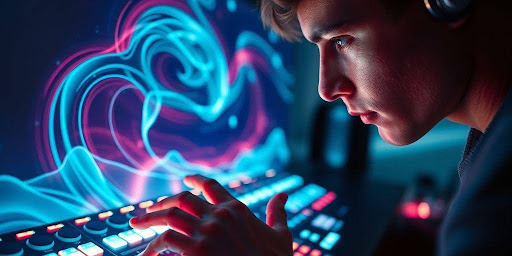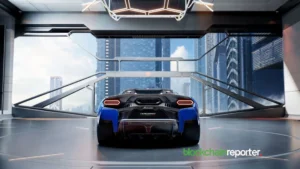Why the Future of Music is Driven by Tech-Savvy Innovators

The Future of Music: How Technology is Transforming the Industry
The Rise of Tech-Savvy Creatives
In the past, music was crafted in garages and small studios, often shared through homemade mixtapes. Today, the landscape has shifted dramatically, with technology playing a pivotal role in shaping our musical experiences. Industry expert Benjy Rostrum emphasizes that the future of music is now intertwined with algorithms, immersive technologies, and innovative minds who are redefining what it means to be a musician. From AI-generated symphonies to virtual concerts in the metaverse, the evolution of music is increasingly driven by tech-savvy individuals who are transforming digital data into profound emotional experiences.
The Spotlight on Tech Innovators
Once seen as outsiders, tech enthusiasts are now at the forefront of the music scene. Many of the most groundbreaking musical experiences today are created by individuals who may not play traditional instruments but excel in coding, simulation, and engineering. These innovators collaborate with artists eager to explore new frontiers in music.
Consider how we now consume music. The days of waiting for a favorite song to play on the radio are long gone. Streaming platforms like Spotify utilize sophisticated algorithms to predict our musical preferences, thanks to the coding behind them. This is music that has become smarter and more personalized.
AI: A New Composer in the Mix
Artificial intelligence has evolved from a novelty to a vital asset in music creation. Tools like AIVA, which crafts cinematic scores, and Google’s MusicLM, which translates text into sound, showcase how machines are now integral to producing music on a larger scale.
It’s crucial to note that AI is not here to replace human musicians; rather, it enhances their creative processes. Producers can leverage AI to create backing tracks, remix existing songs, or even explore entirely new genres. Artists can experiment with previously unheard sounds, effectively having a tireless musical collaborator at their disposal.
AI can also dissect the elements of successful songs, analyzing aspects like tempo and structure, allowing artists to understand what resonates with listeners. We’ve transitioned from merely manipulating records to programming them.
The Emergence of Virtual Concerts
Gone are the days of crowded venues and waving lighters. Now, fans can experience concerts in virtual environments, such as attending a Travis Scott performance in Fortnite or enjoying a DJ set in Decentraland. The metaverse has transformed into a vibrant musical landscape, thanks to the efforts of developers and designers who create immersive virtual experiences.
The popularity of virtual concerts surged during the pandemic and continues to thrive. Behind these experiences are the tech professionals who design virtual worlds and develop real-time rendering technologies. Musicians are no longer confined to physical stages; in the metaverse, performances can defy gravity, visuals can be fantastical, and audiences can reach into the millions.
These virtual events are interactive, allowing fans to engage actively. Avatars can dance, emojis can fly, and attendees can alter their surroundings with a click, creating a level of engagement that was unimaginable just a decade ago.
Blockchain: Revolutionizing Music Economics
The music industry is also witnessing a transformation in how artists earn their livelihoods. Traditional record contracts often left musicians with minimal returns, while labels took the lion’s share of profits. However, blockchain technology and NFTs (non-fungible tokens) are changing the game, enabling artists to sell their music directly to fans and retain more control over their financial futures.
Smart contracts facilitated by blockchain technology simplify the payment process for artists. As Benjy Rostrum notes, there’s no longer a lengthy wait for streaming royalties. Musicians can tokenize their songs, albums, or even concert tickets, offering fans a sense of ownership and creating new revenue opportunities.
Imagine owning a unique remix of a song that only a select few can access or gaining exclusive entry to virtual listening events through specific NFTs. This is the future of music, crafted by individuals fluent in both coding and musical artistry.
Digital Learning: A New Era for Aspiring Musicians
If you’re interested in learning an instrument or composing music, you no longer need to hire a tutor or enroll in a formal program. Online platforms like Yousician, Soundtrap, and BandLab are gamifying music education, making it more engaging and accessible. Behind these platforms are tech experts who understand how to make learning enjoyable and effective.
With tools like MIDI keyboards and looping software, beginners can start creating music right from their computers. They can even collaborate with others worldwide in real time, breaking down barriers and making music creation more inclusive than ever.
Data-Driven Insights in Music
Every interaction—be it a skip, stream, or share—is meticulously tracked. Music platforms possess a wealth of listener data, and tech experts are analyzing this information to uncover not just what people enjoy, but why they enjoy it.
Record labels utilize data analytics to identify emerging artists, while concert promoters analyze streaming patterns to determine optimal locations for shows. Artists themselves can access dashboards that reveal which tracks resonate most with their audience and when listeners are most active. The insights provided by data have become a roadmap to success in the music industry.
A Harmonious Future for Artists and Fans
This technological evolution is not about replacing artistic talent; it’s about empowering it. Musicians who embrace technology can achieve more with fewer resources, reaching global audiences and making informed creative decisions. Fans benefit from immersive experiences, closer connections with artists, and a voice in the music they love.
Whether you’re an independent musician seeking to monetize your work or a fan exploring virtual concerts, the innovations driven by tech enthusiasts are reshaping how we create, discover, and connect through music. The gap between creators and listeners has never been narrower, largely due to the influence of technology.
Conclusion
The music industry is undergoing a significant transformation, akin to a complete system overhaul. From the days of sharing mixtapes to experiencing concerts in virtual realms, the journey has been remarkable. One thing is clear: the future of music belongs to those who can blend creativity with technology. Whether you’re a coder, a DJ, or a passionate fan, the soundtrack of tomorrow is already being composed, with tech innovators leading the way.






